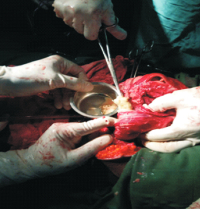Pyomyoma presenting as a case of acute abdomen: A case report
Main Article Content
Abstract
Background: uterine Leiomyomata is common benign pelvic tumour in our environment. It usually presents with menstrual irregularities and pressure symptoms. Pyomyoma (suppurative leiomyoma) is a rare complication associated with degenerating leiomyoma which often results in serious complications. Though most reported cases have occurred in pregnant or postmenopausal women, we present a case of pyomyoma in a young Nigerian woman.
Case presentation: she is a 32 year old nulliparous housewife who presented with abdominal pain and swelling of 4 months duration and fever of 2 weeks duration. She had a history of leiomyoma having done an earlier ultrasound scan. She used some Chinese herbal medications prior to the worsening of the abdominal pain and onset of fever. She also used several oral and intravenous broad spectrum antibiotics with no relief of her symptoms. Abdominal examination revealed a 28 weeks size pelvic mass, tender with differential warmth. Ultrasound scan reported features suggestive of multiple loculated pelvic abscesses with the uterus, ovaries and tubes not visualized. With the clinical impression of an acute abdomen with pelvic abscess collection and coexisting uterine fibroids, an exploratory laparotomy was done. Intra-operative findings revealed pyoperitoneum of 1.5 litres and a bulky uterus riddled with degenerating fibroids contained in intra-myometrial pus filled cavities in the uterus. The postoperative course surprisingly was uneventful.
Conclusion: pyomyoma is rare and may be difficult to be diagnosed clinically especially when there is a non-specific presentation as in this patient. Prompt clinical suspicion, broad spectrum antibiotics use and surgical intervention can be life-saving.
Downloads
Article Details
Section

This work is licensed under a Creative Commons Attribution-NonCommercial-NoDerivatives 4.0 International License.
The Journal is owned, published and copyrighted by the Nigerian Medical Association, River state Branch. The copyright of papers published are vested in the journal and the publisher. In line with our open access policy and the Creative Commons Attribution License policy authors are allowed to share their work with an acknowledgement of the work's authorship and initial publication in this journal.
This is an open access journal which means that all content is freely available without charge to the user or his/her institution. Users are allowed to read, download, copy, distribute, print, search, or link to the full texts of the articles in this journal without asking prior permission from the publisher or the author.
The use of general descriptive names, trade names, trademarks, and so forth in this publication, even if not specifically identified, does not imply that these names are not protected by the relevant laws and regulations. While the advice and information in this journal are believed to be true and accurate on the date of its going to press, neither the authors, the editors, nor the publisher can accept any legal responsibility for any errors or omissions that may be made. The publisher makes no warranty, express or implied, with respect to the material contained herein.
TNHJ also supports open access archiving of articles published in the journal after three months of publication. Authors are permitted and encouraged to post their work online (e.g, in institutional repositories or on their website) within the stated period, as it can lead to productive exchanges, as well as earlier and greater citation of published work (See The Effect of Open Access). All requests for permission for open access archiving outside this period should be sent to the editor via email to editor@tnhjph.com.

